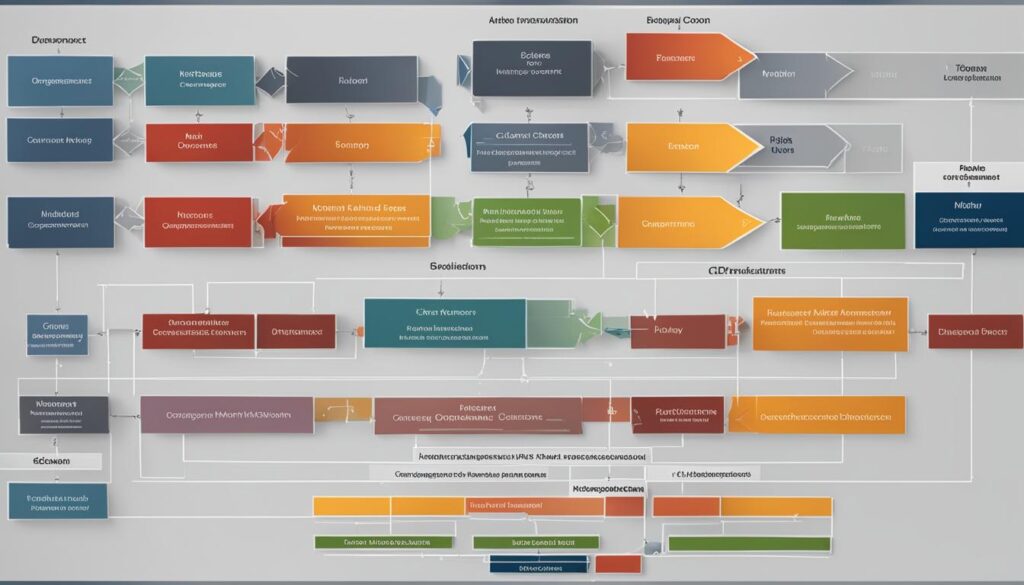The California Department of Insurance (CDI) is a crucial regulatory agency that protects consumers and regulates the insurance industry in the state. Led by Insurance Commissioner Ricardo Lara, CDI ensures fair practices in the insurance marketplace and safeguards the rights of California residents.
With a history dating back to 1868, CDI is responsible for overseeing more than 1,400 insurance companies and licensing over 495,000 agents and brokers. Their primary goal is to regulate the insurance industry, investigate consumer complaints, and prosecute insurance fraud, all while ensuring consumer protection and a well-functioning insurance marketplace.
Key Takeaways:
- The California Department of Insurance (CDI) is led by Insurance Commissioner Ricardo Lara.
- CDI regulates over 1,400 insurance companies and licenses over 495,000 agents and brokers.
- The main focus of CDI is to ensure fair practices in the insurance marketplace and protect consumers’ rights.
- CDI investigates consumer complaints and prosecutes insurance fraud.
- CDI plays a vital role in creating a well-regulated insurance industry that benefits both consumers and insurers.
The History and Mission of CDI
The California Department of Insurance (CDI) has a rich history dating back to its establishment in 1868. Throughout the years, CDI has adapted to the ever-changing insurance landscape, protecting and serving the needs of California residents.
At its core, CDI is a consumer protection agency dedicated to ensuring fair regulation of the insurance industry. The department works tirelessly to safeguard the rights of consumers and maintain a level playing field for all stakeholders.
CDI’s mission is multifaceted, encompassing various key responsibilities:
- Regulating Insurer Rates: CDI ensures that insurance rates in California are not excessive, inadequate, or unfairly discriminatory, promoting fair practices within the industry.
- Overseeing Insurer Solvency: As part of its regulatory function, CDI monitors the financial stability of insurance companies, protecting consumers from the potential risks associated with insolvent insurers.
- Setting Licensing Standards: CDI establishes licensing standards for insurance agents and brokers, ensuring that individuals operating in the industry meet specific criteria and adhere to ethical and professional standards.
- Performing Market Conduct Reviews: CDI conducts comprehensive reviews of insurance marketplace activities to ensure compliance with regulations, promote transparency, and protect consumer interests.
- Resolving Consumer Complaints: CDI provides a platform for consumers to voice their concerns and resolve complaints related to insurance matters, promoting a fair and transparent process.
- Investigating and Prosecuting Insurance Fraud: CDI actively investigates instances of insurance fraud, taking appropriate legal action to protect consumers and maintain the integrity of the insurance industry.
With its dedicated employees and unwavering commitment to consumer protection, CDI plays a vital role in promoting fair regulation in the insurance industry and safeguarding the interests of California residents.
Image depicting a magnifying glass over insurance documents, representing the need to combat insurance fraud.
The Organization of CDI

The California Department of Insurance (CDI) carries out its responsibilities through various branches and offices, ensuring efficient regulation and consumer protection in the insurance industry.
CDI’s organizational structure includes:
Administration and Licensing Services Branch
Responsible for licensing agents and brokers, providing administrative support, and managing licensing processes.
Community Relations and Outreach Branch
Engages with communities to promote consumer awareness and education, as well as establish partnerships and collaborations.
Consumer Services and Market Conduct Branch
Conducts market conduct reviews to ensure compliance with insurance laws and regulations, handles consumer complaints, and provides assistance and guidance to consumers.
Enforcement Branch
Enforces insurance laws, investigates violations, takes appropriate disciplinary actions against violators, and protects consumers from fraudulent insurance activities.
Enterprise Planning, Risk and Compliance
Monitors and manages enterprise planning, risk assessment, and compliance with laws, regulations, and policies.
Financial Surveillance Branch
Monitors the financial stability of insurance companies, assesses their solvency, and takes necessary actions to protect policyholders and maintain a stable insurance marketplace.
Legal Branch
Provides legal support and guidance to CDI by interpreting and analyzing insurance laws, policies, and regulations, as well as representing CDI in legal proceedings.
Policy and Legislation Branch
Develops and analyzes insurance-related policies and legislation, ensuring that they align with consumer protection and effective insurance regulation.
Rate Regulations Branch
Analyzes rate filings submitted by insurance companies, evaluates the reasonableness of insurance rates, and protects consumers from excessive or unfairly discriminatory rates.
Each branch plays a crucial role in CDI’s overall mission of protecting consumers, enforcing insurance laws, and maintaining a fair and transparent insurance marketplace.
The Role of CDI in Health Insurance

The California Department of Insurance (CDI) plays a crucial role in the regulation of health insurance companies in California. As the governing body responsible for health insurance regulation, CDI ensures that health insurance companies comply with the law and protect the rights of consumers.
CDI understands that navigating the complexities of health insurance can be challenging for consumers. That is why they provide valuable resources and assistance to help individuals understand their health insurance policies and make informed decisions. CDI is dedicated to promoting transparency and ensuring consumers have the knowledge they need to choose the right health insurance coverage for themselves and their families.
Filing complaints and appeals can be a daunting process, but CDI is here to help. If you encounter any issues with your health insurance coverage, CDI offers guidance and support in filing complaints and appeals to ensure that your rights are protected.
In addition to their role in health insurance regulation, CDI collaborates with other agencies to provide support and information for Medicare beneficiaries. Whether you need assistance with understanding your Medicare coverage or navigating the enrollment process, CDI is committed to helping you make informed decisions about your healthcare options.
One of the valuable resources available through CDI is the Health Insurance Counseling and Advocacy Program (HICAP). HICAP provides free, unbiased information and counseling to individuals who need assistance navigating their Medicare coverage and options. Whether you have questions about Medicare eligibility, coverage, or enrollment, HICAP can provide the guidance and support you need.
CDI’s Authority in Health Insurance
The authority granted to CDI in regulating health insurance is extensive. CDI has the power to review health insurance rates to ensure they are fair and not excessive, inadequate, or unfairly discriminatory. They also monitor health insurance companies to ensure their financial stability and compliance with state laws and regulations.
CDI’s authority extends to investigating and taking action against health insurance companies that engage in fraudulent practices or violate consumer protection laws. This includes investigating complaints filed by consumers and taking appropriate enforcement actions to hold companies accountable.
CDI’s role in health insurance regulation is essential to safeguarding the rights of California consumers. They work diligently to ensure that health insurance companies operate in a fair and ethical manner, providing consumers with the protection and coverage they need.
| CDI’s Role in Health Insurance | CDI’s Authority in Health Insurance |
|---|---|
| Ensuring health insurance companies comply with the law | Reviewing health insurance rates |
| Protecting the rights of consumers | Monitoring financial stability of health insurance companies |
| Assisting consumers in understanding their health insurance policies | Investigating and taking action against fraudulent practices |
| Filing complaints and appeals | Enforcing consumer protection laws |
| Collaborating with other agencies for Medicare support | Investigating consumer complaints |
Understanding Health Insurance Basics

Health insurance is a crucial aspect of financial planning, providing coverage for medical expenses and ensuring access to necessary healthcare services. To navigate the complexities of health insurance, it is essential to understand the basics, including coverage, benefits, costs, insurance terms, preventive care, and essential health benefits.
Health Insurance Coverage:
Health insurance coverage encompasses a range of medical services and treatments. It typically includes benefits such as:
- Hospital care
- Visits to doctors and specialists
- Preventive care
- Mental health care
- Emergency and urgent care
By understanding the scope of coverage, individuals can make informed decisions about their healthcare needs.
Costs Associated with Health Insurance:
Health insurance involves various costs that individuals must be aware of. These include:
- Premiums: The monthly or annual fees paid to maintain the insurance.
- Deductibles: The amount individuals must pay out of pocket before the insurance coverage begins.
- Co-pays: Fixed amounts paid for specific services, such as doctor visits or prescription medications.
- Co-insurance: A percentage of the total cost shared between the individual and the insurance company.
- Annual out-of-pocket limits: The maximum amount individuals are required to pay in a year for covered services.
Understanding these costs is crucial for budgeting and managing healthcare expenses effectively.
Insurance Terms:
Health insurance comes with its own set of terms that individuals should familiarize themselves with. Some common terms include:
- Premium: The cost of the insurance plan.
- Network: The group of healthcare providers and hospitals that have agreed to provide services at a negotiated rate.
- Covered services: The medical services and treatments included in the insurance plan.
- Out-of-network: Healthcare providers who are not part of the insurance plan’s network.
- Claim: The request sent to the insurance company for coverage and reimbursement of medical expenses.
Having a good grasp of these terms empowers individuals to make informed decisions and effectively communicate with insurance providers.
Essential Health Benefits:
The Affordable Care Act mandates that health insurance plans provide essential health benefits. These benefits encompass a range of preventive care services that are covered without any out-of-pocket costs. Examples of essential health benefits include:
- Immunizations and vaccinations
- Screenings for cancer, cholesterol, and blood pressure
- Contraceptive services
- Wellness visits and preventive care for children
Knowing about essential health benefits ensures individuals can take advantage of preventive care services and maintain their overall well-being without additional financial burdens.
“Understanding the basics of health insurance is essential for consumers to make informed decisions about their healthcare needs and financial well-being.”
Consumers can rely on resources provided by the California Department of Insurance (CDI) to navigate the complexities of health insurance. CDI offers informative materials, guidance, and assistance to ensure individuals have the knowledge and tools to make educated choices about their health insurance coverage.
Shopping for Health Insurance in California

When shopping for health insurance in California, consumers have several options. One of the most popular choices is Covered California, the state’s official health insurance marketplace. Covered California offers a wide range of health insurance plans to meet the diverse needs of consumers.
One valuable resource provided by the California Department of Insurance (CDI) is the Health Plan Report Card. This report card allows consumers to compare different health plans based on quality and performance indicators. It provides essential information about each health plan, including customer satisfaction ratings, network adequacy, and patient safety measures.
Furthermore, CDI maintains a comprehensive list of health insurers operating in California. Consumers can refer to this list to explore their options and find health insurance providers that best suit their needs and preferences.
| Insurance Company | Rating | Customer Satisfaction | Affordability |
|---|---|---|---|
| Blue Shield of California | A+ | 4.5/5 | ★★★☆☆ |
| Kaiser Permanente | A | 4.8/5 | ★★★★☆ |
| Anthem Blue Cross | B+ | 4.2/5 | ★★★☆☆ |
| Health Net | B | 4/5 | ★★★☆☆ |
By utilizing the resources provided by CDI and considering factors such as affordability, network coverage, and customer satisfaction, consumers can make informed decisions when shopping for health insurance in California.
Rights and Responsibilities in Health Insurance

When it comes to health insurance, consumers have both rights and responsibilities. The California Department of Insurance (CDI) understands the importance of policy understanding and ensures that consumers are well-informed about their rights. CDI is dedicated to protecting consumers’ health insurance rights and providing the necessary assistance when issues arise.
One of the main responsibilities of CDI is helping consumers understand their health insurance policies. It can be overwhelming to navigate the complex terminology and coverage details. CDI provides resources and guidance to ensure consumers have a clear understanding of what their policy entails.
CDI recognizes that problems and disputes may arise with health insurance coverage. In such cases, consumers have the right to file complaints and seek assistance. CDI offers a streamlined process for filing complaints and will intervene on behalf of consumers to help resolve issues with insurance companies.
“CDI is committed to protecting consumer rights and providing assistance in navigating the complexities of health insurance policies.”
CDI is dedicated to ensuring that consumers have access to the healthcare services they need. Whether it’s filing complaints, appealing coverage decisions, or obtaining assistance, CDI is there to support consumers throughout the process.
Consumers can take advantage of CDI’s resources and expertise to have a thorough understanding of their health insurance rights, receive guidance when dealing with insurance companies, and ensure that their needs are met in terms of healthcare coverage.
The table below summarizes the rights and responsibilities of consumers in health insurance:
| Rights | Responsibilities |
|---|---|
| Access to healthcare services | Understand insurance policy |
| File complaints | Pay premiums on time |
| Appeal coverage decisions | Provide accurate information to the insurer |
| Receive assistance from CDI | Inform CDI of any issues or disputes |
To learn more about your rights and responsibilities in health insurance, visit CDI’s website or contact their consumer services department.
Loss of Health Insurance Coverage

Sometimes individuals may experience a loss of health insurance coverage. This can happen due to various reasons such as job loss, aging out of a parent’s plan, or changes in eligibility. When faced with losing health insurance coverage, it’s important to explore alternative options to maintain necessary healthcare benefits.
One option available is COBRA continuation coverage. COBRA, which stands for Consolidated Omnibus Budget Reconciliation Act, is a federal law that may allow individuals to continue their health insurance coverage for a limited time. It applies to certain situations like job loss or reduction of work hours. COBRA coverage is typically more expensive as individuals are required to pay the full premium, including the portion previously covered by their employer.
In addition to COBRA, individuals can consider purchasing individual or family coverage. This involves exploring health insurance plans available in the market. CDI can provide guidance and resources to help individuals navigate their options and find suitable coverage that meets their needs and budget.
Here is a comparison of COBRA continuation coverage and individual/family coverage:
| COBRA Continuation Coverage | Individual/Family Coverage |
|---|---|
| Continues existing health insurance | Purchasing a new health insurance plan |
| May be more expensive as individual pays full premium | Premiums vary depending on the plan and coverage |
| Temporary coverage, usually up to 18 months | Long-term coverage as per plan selection |
| Covered by the same insurance company as before | Choice of different insurance providers |
It is essential to consider individual circumstances and coverage needs when deciding between COBRA continuation coverage and individual/family coverage. CDI offers comprehensive information and resources to help individuals make informed decisions regarding health insurance during times of loss of coverage.
The California Department of Insurance, as the protection agency for the nation’s largest insurance marketplace, plays a crucial role in overseeing and fairly regulating the insurance industry. Led by Insurance Commissioner Ricardo Lara, the department, established in 1868, safeguards all of the state’s consumers by resolving consumer complaints, enforcing cease and desist orders against inadequate and unfairly discriminatory practices, and innovating outreach strategies. Situated at 300 S Spring St Fl 14, Los Angeles, CA 90013, the department, with its official ticker symbol on ZoomInfo and LinkedIn, continues to inform and protect California consumers.
Committed to consumer protection, the California Department of Insurance investigates insurance fraud, handles complaints, and provides essential services such as issuing licenses and regulating premium rates. Furthermore, the department, through its website insurance.ca.gov, offers frequently asked questions regarding the California insurance market, serving as a valuable resource for those seeking information about homeowners insurance, casualty insurance, and property insurance.
The department’s headquarters are not only a hub for regulatory efforts but also a vital entity ensuring the insurance marketplace remains just, transparent, and responsive to the needs of the Californian population.
Also Read : Beyond Premiums: How Smart Health Insurance Is Transforming Healthcare Access
Conclusion
The California Department of Insurance (CDI) plays a vital role in protecting consumers and regulating the insurance industry in the state. With a strong focus on consumer protection, CDI ensures fair practices in the insurance marketplace and safeguards the rights of California residents. Through their various branches and offices, CDI oversees insurance companies, resolves consumer complaints, investigates fraud, and provides resources and assistance for consumers to understand and navigate health insurance. CDI’s efforts contribute to a well-regulated insurance industry that benefits both consumers and insurers alike.
FAQs
Q: What is the California Department of Insurance and what does it do?
A: The California Department of Insurance is the state agency responsible for regulating the insurance industry, protecting consumers, and ensuring a competitive insurance marketplace in California.
Q: How can I contact the California Department of Insurance?
A: You can contact the California Department of Insurance by visiting their website or calling their main office at [insert contact details].
Q: What types of insurance does the California Department of Insurance regulate?
A: The California Department of Insurance regulates various types of insurance such as health, life, auto, and homeowners insurance, among others.
Q: What protection does the California Department of Insurance offer to consumers?
A: The California Department of Insurance offers consumer protection by overseeing insurance companies, handling complaints, and ensuring fair treatment of policyholders.
Q: Where can I find a directory of insurance carriers regulated by the California Department of Insurance?
A: You can browse directories of insurance carriers regulated by the California Department of Insurance on their official website.
Q: What are the functions of the California Department of Insurance in terms of employee protection?
A: The California Department of Insurance safeguards employees by ensuring fair treatment and adherence to labor laws within the insurance industry.
Q: How does the California Department of Insurance address wildfire risk?
A: The California Department of Insurance addresses wildfire risk by working with insurers to underwrite policies for properties in high-risk areas and promoting wildfire prevention and mitigation efforts.
Q: What are the roles of the California Department of Insurance in the largest insurance marketplace?
A: The California Department of Insurance oversees and safeguards the largest insurance marketplace in the state by regulating insurance policies and ensuring fair practices.
Q: How can I stay updated with news and information from the California Department of Insurance?
A: You can follow the California Department of Insurance on their social media channels such as LinkedIn, Facebook, and other platforms for updates and information.
Q: What are the key initiatives of the California Department of Insurance in 2022?
A: The California Department of Insurance is focusing on initiatives related to consumer protection, enhancing insurance market competition, and addressing emerging insurance challenges in 2022.
Source Links
- https://www.insurance.ca.gov/0500-about-us/02-department/
- https://www.insurance.ca.gov/01-consumers/105-type/95-guides/05-health/health-ins-guide.cfm
- https://www.insurance.ca.gov/01-consumers/110-health/